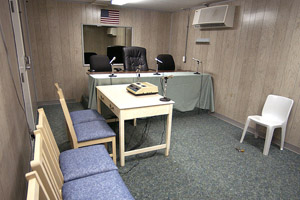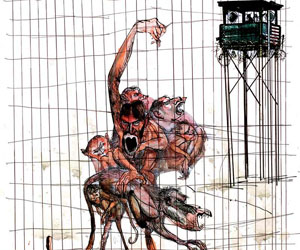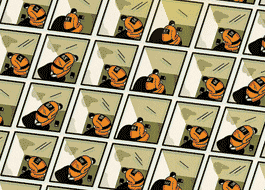
<a href="http://commons.wikimedia.org/wiki/File:US_Navy_040729-N-6939M-001_The_facility_where_the_Combatant_Status_Review_Tribunals_(CSRT)_will_take_place_for_detained_enemy_combatants.jpg">US Navy</a>
Under rules drawn up in hasty response to a 2004 Supreme Court ruling, the Pentagon gave the Guantanamo detainees one chance to prove that they were not—as the U.S. government had vigorously asserted for the past two years—“the worst of the worst.” Between July 2004 and January 2005, the military held hundreds of combatant status review tribunals, one-time hearings in which detainees went before a panel of three unidentified American officers who reviewed the government’s reasons for holding them as enemy combatants. Detainees couldrespond directly to the accusations made against them and were assigned to an officer who shepherded them through the process. However, they did not have access to lawyers and often could not fully examine the government’s claims, particularly if those claims were based on classified information. Of the 558 detainees who faced tribunals, 38 were declared “No Longer Enemy Combatants.” (Thirty-five have since been released.) Asked about the process, then-Secretary of the Navy Gordon England said, “Obviously, it’s not perfect.” In June, the Supreme Court agreed, ruling that the tribunals had violated federal law and the Geneva Conventions. Soon afterwards, the Pentagon announced it would begin to follow the conventions’ protections for detainees. These excerpts were taken from the thousands of pages of tribunal transcripts released this spring under the Freedom of Information Act.
Detainee 152, a Yemeni named Asim Thahit Abdullah Al Khalaqi, was confronted with a list of the U.S. government’s reasons for calling him an enemy combatant.
Al Khalaqi: Are these evidence or accusations?
Tribunal President: They are in the form of both….
Al Khalaqi: I’m sorry, I just don’t understand. How does it fit the two pictures or definitions? For example, if I say this table is the chair and the chair is the table and they are the same thing, does that make sense?
Tribunal President: No, that doesn’t make sense. But this process makes sense to me and hopefully it will make sense to you, because you’re the one who’s going to have to provide us with evidence and tell us that you did or did not do these things as listed on the summary of evidence.
Al Khalaqi: So I just answer the accusations. But I’m going to call it accusations. I’m not going to call it evidence.
Tribunal President: Very well, you can call it as you wish.
Detainee 024, a 24-year-old British citizen named Feroz Ali Abbasi, was released and sent back to England in January 2005.
Abbasi: So, you are telling me I am an enemy combatant. I am telling you by special Geneva Conventions, I am a non-combatant….
Tribunal President: Once again, international law does not matter here. Geneva Convention does not matter here. What matters here and I am concerned about and what I really want to get to is your status as enemy combatant based upon the evidence that has been provided and your actions while you were in Afghanistan. If you deviate from that one more time you will be removed from this tribunal and we will continue to hear evidence without you being present….
Abbasi: I know, but I have the right to speak….
Tribunal President: No, you don’t.
Abbasi: And the personal representative told me I can say whatever I like.
Tribunal President: He was mistaken if he told you that….
[Abbasi continues to speak at length.]
Tribunal President: Once again…international law…. [Abbasi interrupts.] Mr. Abbasi, your conduct is unacceptable and this is your absolute final warning. I don’t care about international law. I don’t want to hear the words “international law” again. We are not concerned with international law.
The tribunal unanimously affirmed that Detainee 1094, Saifullah Paracha, a 57-year-old Pakistani businessman, was an enemy combatant.
Tribunal President: I do know you had some questions about the legality of your detention. That would be referred to other organizations of the government, but you will be receiving more specific instructions shortly of how to bring your question to U.S. courts.
Paracha: Your honor, I have been here 17 months; would that be before I expire?
Tribunal President: I would certainly hope so, especially since you are under the care of the U.S. government while you are here. As far as some of the other statements you made about jurisdiction, this is a U.S. government executive decision in regards to the detention of enemy combatants….
Paracha: Your honor, my question is that your executive order is applicable around the earth?
Tribunal President: It is a global war on terrorism.
Paracha: I know, sir, but you are not the master of the earth, sir….
Tribunal President: Would you be surprised to hear that Osama bin Laden founded Al Qaeda and Al Qaeda includes people from all over the world? People from America, Afghanistan, Pakistan, Philippines, and people from wherever?
Paracha: Sir, how could anybody know who Al Qaeda is?
Tribunal President: Good question. That’s a very good question.
Detainee 369, Adel Fattough Ali Algazzar, an Egyptian arrested in Pakistan.
Algazzar: I am disappointed with this tribunal because if I am in a court and you accuse me of anything I should be allowed to know what the accusations are and to see the evidence. You tell me that these accusations are unclassified but there are other classified accusations. How can I defend myself if I don’t know what the evidence is about the other accusations?….
Tribunal Member: If I can clarify a little bit before you start. These are all the accusations. What we will get in the classified session is in theory evidence to support these accusations, but there are no other accusations against you besides what is listed here.
Algazzar: I understand that but what I mean is if you say I am an enemy combatant and you say you have evidence, I don’t get to see it. Then I will stay here….
Tribunal Member: Do you have any theories about why the government and the Pakistani intel folks would sell you out and turn you over to the Americans?
Algazzar: Come on, man, you know what happened. In Pakistan you can buy people for $10. So what about $5,000?
Tribunal Member: So they sold you?
Algazzar: Yes.
Detainee 197, a Moroccan named Yunis Abdurrahman Shokuri.
Shokuri: [T]he only way I know the United States is through movies from Hollywood or through cartoons. I’m a big fan of a lot of their singers…. [T]he first time I saw an American soldier was at Kandahar Air Base…. When I first saw myself in Kandahar, it was like I was in a cinema or a movie. I saw a 1996 movie called The Siege. The movie was about terrorists carrying out terrorist attacks in the United States…. [In the movie] the CIA and FBI were not successful in finding that terrorist group and the United States Army interfered and gathered all the people of Arabic descent and put them in a land cage or camp just like it happened in Kandahar. I was shocked, thinking, “Am I in that movie or on a stage in Hollywood?”…Sometimes I laugh at myself and say, “When does that movie end?”
“Three years ago I was 23 years old but now I feel like 100 years old,” Detainee 972, an Afghan named Alif Mohammed, told the tribunal. He was suspected of using a satellite phone to set up an ambush on American forces.
Mohammed: I swear to God that I don’t have a telephone. I never had a telephone. I can’t even write my name. You can ask my people. I am illiterate. I’m just a tinsmith…. I have great respect for [Americans]. They’re always welcome. We are happy for them that they came to Afghanistan. There is less violence. I will never fight against them. I have never fought in the past. I always support them. If anyone proves that I have worked…with Al Qaeda or the Taliban, you can cut my throat right here. Otherwise, let me go. I have 10 kids at home that are waiting for me. God is watching upon you. I am very happy for this tribunal. This tribunal will bring out the facts. I have never fought and I will never fight you guys…. How can I fight? I am just a tinsmith…. When you release me, I hope you give me some money. Americans are rich. They have more money. I have 10 people.
Detainee 581 was accused of being Abdur Zahid Rahman, the Taliban’s former deputy foreign minister. He explained to the tribunal that he was, in fact, Abdur Sayed Rahman.
Rahman: The entire time I have been here, I have not seen anything proving that I did anything wrong…. I have been here for three years and the past three years, whatever I say, nobody believes me…. I never even hit my own child at home. Why would I go and torture and murder someone?…The only time I have ever been in Afghanistan was for two days to attend a funeral…. I was only a chicken farmer in Pakistan.
More than a dozen detainees were cited for owning cheap digital watches, particularly “the infamous Casio watch of the type used by Al Qaeda members for bomb detonators.”
Detainee 651, Usama Hassan Ahmend Abu Kabir: I have a Casio watch due to the fact that they are inexpensive and they last a long time. I like my watch because it is durable. It had a calculator and was waterproof, and before prayers we have to wash up all the way to my elbows.
Detainee 298, Salih Uyar: If it is a crime to carry this watch, your own military personnel also carry this watch. Does this mean they’re just terrorists as well?
Detainee 228, Abdullah Kamel Abudallah Kamel: When they told me that Casios were used by Al Qaeda and the watch was for explosives, I was shocked…. If I had known that, I would have thrown it away. I’m not stupid. We have four chaplains [at Guantanamo]; all of them wear this watch.
Detainee 154, Mazin Salih Musaid Al Awfi: Millions and millions of people have these types of Casio watches. If that is a crime, why doesn’t the United States arrest and sentence all the shops and people who own them? This is not a logical or reasonable piece of evidence.
Detainee 498, a Yemeni named Mohammed Ahmed Said Haidel.
Haidel: When I was in the Kandahar prison, the interrogator hit my arm and told me I received training in mortars. As he was hitting me, I kept telling him, “No, I didn’t receive training.” I was crying and finally I told him I did receive the training. My hands were tied behind my back and my knees were on the ground and my head was bleeding. I was in a lot of pain, so I said I had the training. At that point, with all my suffering, if he had asked me if I was Osama bin Laden, I would have said yes…. Am I an enemy of the United States? I never knew any Americans until I came to this prison. Americans should know who their real enemies are. What is my crime for being here for three years? That is all I would like to say.
Detainee 954, an Afghan named Abdul Ghafour, was accused of firing at U.S. troops.
Ghafour: I have a mother, my wife, kids, sister, and myself in my house. If I fired at Americans it meant suicide for my family. That means destroying and killing your own family…. I was not that crazy and not that stupid to shoot at Americans from my own roof. That’d mean I killed my own kids and family…. If I had known they were people from the government or they were Americans, this would have never happened. I was still thinking they were thieves and they came to rob us…. I don’t get it. Why am I in Cuba?

















